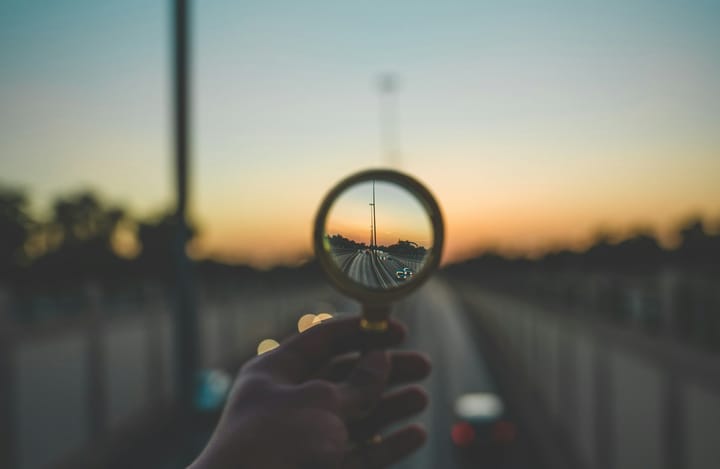Sleep Tools That Actually Work (For People Who've Tried Everything)
Lying awake at 3 am, wondering why your brain won't shut up? Sleep hacks from a recovering insomniac who tried everything - no 'just relax' BS, real solutions for real insomniacs.
Lying awake at 3 am, wondering why your brain won't shut up?
You've tried everything the internet suggested: chamomile tea (tastes like yard clippings), meditation apps (your brain laughs at them), counting sheep (they turned into a spreadsheet somehow).
Meanwhile, you're scrolling your phone because sleep feels impossible and at least TikTok understands your pain.
Here's what nobody tells you: Most sleep advice is written by people who fall asleep in 10 minutes and think insomnia is just "not trying hard enough."
Sleep hacks from a recovering insomniac who tried everything from $300 weighted blankets to sleeping on the floor. No "just relax" BS - real solutions for real insomniacs who need sleep more than they need another lecture about screen time.
Why Most Sleep Advice is Garbage
Their advice: "Just stop looking at screens before bed."
Your reality: Your phone is the only thing keeping you company during 3am anxiety spirals.
Their advice: "Keep a consistent sleep schedule."
Your reality: Your brain doesn't check the calendar before deciding to replay every embarrassing moment from 7th grade.
Their advice: "Create a relaxing bedtime routine."
Your reality: You tried. Your brain uses "relaxing" time to solve all of life's problems and plan imaginary conversations.
The truth: Sleep struggles aren't a willpower problem. They're a tool problem.
🎯 The Sleep Deprivation Reality Check
What Actually Keeps You Awake
The overthinking brain: Replaying conversations, planning tomorrow, solving problems that don't exist
The anxiety spiral: Worrying about not sleeping, which makes you not sleep, which makes you worry
The physical discomfort: Too hot, too cold, too itchy, too everything
The environment chaos: Noise, light, partner snoring, neighbor's dog
The caffeine hangover: That afternoon coffee still partying in your system
The relief: Most of these have actual tool-based solutions. You don't need to meditate your way to sleep.
🚀 Sleep Tools by Problem Type
For the Overthinking Brain: Mental Off-Switch Tools
Brain.fm - Your Focus Destroyer
- What it does: Uses neuroscience-based soundscapes designed to shut down active thinking
- Why it works: Specific frequencies that actually change brain wave patterns
- Cost: $7/month (cheaper than therapy)
- Real test: I went from 2-hour mental spirals to 15-minute shutdowns
The "4-7-8" Breathing Hack (Free)
- How: Breathe in for 4, hold for 7, out for 8
- Why it works: Forces your nervous system into relaxation mode
- Secret sauce: Do it 4 times, then stop counting and just breathe normally
- Reality check: Feels weird at first, works by week 2
Insight Timer App - Meditation for Skeptics
- Best feature: Sleep stories that are actually interesting (not just "imagine you're a cloud")
- Free option: Thousands of sleep meditations
- Pro tip: Search for "sleep stories" not "meditation" - different vibe entirely
For Physical Discomfort: Environment Control Tools
Weighted Blanket - The Hug You Need
- Sweet spot: 10% of your body weight
- Why it works: Deep pressure stimulation calms nervous system
- Best budget option: YnM weighted blanket ($60-80)
- Reality check: Takes 3-4 nights to get used to, then you can't sleep without it
Temperature Control Arsenal
- ChiliPad/Ooler: Bed cooling system ($400-700, but game-changing)
- Budget hack: Cooling mattress pad + fan ($50-100)
- Free solution: Ice pack on pulse points for 2 minutes before bed
- The science: Core body temperature drop triggers sleep hormones
Blackout Everything Kit
- Sleep mask: MZOO contoured mask (doesn't mess up eyelashes)
- Window coverage: Blackout curtains + blackout film for gaps
- Device lights: Black electrical tape over every LED
- Emergency kit: Eye mask + earplugs for travel/partner snoring
For Noise Issues: Sound Management Tools
White Noise vs Brown Noise vs Pink Noise
- White noise: All frequencies equally (sounds like static) - good for consistent masking
- Brown noise: Lower frequencies (deeper, like ocean waves) - better for anxiety
- Pink noise: Balanced frequencies (like rainfall) - best for most people
- Free apps: Noisli, Rain Rain, or just YouTube "brown noise 8 hours"
Earplugs That Don't Suck
- Silicone putty: Mack's Pillow Soft (molds to your ear, stays put)
- Foam: Howard Leight MAX (highest noise reduction rating)
- Reusable: Loop Quiet (comfortable for side sleepers)
- Pro tip: Warm foam earplugs between fingers before inserting
Sound Machines Worth Buying
- Dohm Classic: Actual fan, not recording (consistent, natural sound)
- LectroFan: 20 sounds, portable, doesn't loop
- Budget: Phone app + decent speaker (honestly works fine)
For Anxiety Spirals: Worry Management Tools
The Worry Window Technique
- Setup: Designated 15-minute "worry time" earlier in the day
- Rule: When worries pop up at bedtime, write them down for tomorrow's worry window
- Why it works: Brain stops panicking because it knows there's a plan
- Notebook: Keep by bed, write in dark (messy writing is fine)
Magnesium Glycinate - The Chill Pill
- Dose: 200-400mg, 30 minutes before bed
- Why this form: Doesn't cause digestive issues like other magnesium
- What it does: Relaxes muscles and nervous system
- Reality check: Not a sleeping pill, just takes the edge off anxiety
Rescue Remedy Sleep - Flower Power
- What it is: Bach flower essences (sounds hippie, actually works)
- How: 4 drops under tongue when you get in bed
- Why it helps: Reduces the "wired but tired" feeling
- Skeptic's note: Placebo or not, if it works, it works
For Racing Thoughts: Mental Redirect Tools
Podcast Sleep Stories
- Sleep With Me: Guy with boring voice tells meandering stories about nothing
- Nothing Much Happens: Cozy, simple stories designed to be forgettable
- Mystery/True Crime: Something engaging enough to stop your thoughts but familiar enough to ignore
The Alphabet Game
- Version 1: Name animals A-Z
- Version 2: Name foods A-Z
- Version 3: Name movies A-Z
- Why it works: Gives your brain a boring task while you drift off
Progressive Muscle Relaxation
- How: Tense each muscle group for 5 seconds, then release
- Order: Toes → calves → thighs → glutes → stomach → shoulders → arms → face
- Secret: Focus on the release, not the tension
- Apps: Calm, Headspace, or YouTube "progressive muscle relaxation"
⚡ The Nuclear Sleep Option: When Nothing Else Works
Sleep Restriction Therapy (The Counterintuitive Approach)
The concept: Limit time in bed to force deeper sleep
How it works: If you sleep 5 hours but spend 8 in bed, only stay in bed 5.5 hours
The rule: No lying awake in bed for more than 20 minutes
Reality check: First week sucks, second week you're sleeping like a baby
Steps:
- Track current sleep for 1 week (actual sleep time, not bed time)
- Set bedtime based on average sleep + 30 minutes
- Same wake time every day (weekends too)
- If awake 20+ minutes, get up and do quiet activity
- Only return to bed when sleepy
Warning: Do this under medical supervision if you have serious sleep issues.
🔋 The Complete Sleep Stack (What Actually Works)
The Basic Stack ($50-100)
- Brown noise app (free)
- Magnesium glycinate supplement ($15)
- Basic blackout setup ($30-50)
- Consistent sleep restriction schedule (free but hard)
The Intermediate Stack ($200-300)
- Quality weighted blanket ($80)
- Decent sound machine ($50)
- Temperature control solution ($100)
- Sleep tracking (free with phone)
The Nuclear Stack ($500+)
- Bed cooling system ($400-700)
- High-end weighted blanket ($150)
- Professional blackout setup ($100-200)
- Sleep study + professional help (insurance dependent)
🚫 Sleep Tools That Are Usually Waste of Money
Expensive mattresses: Sleep position and environment matter more than mattress brand
Blue light blocking glasses: Just use night mode on devices
Sleep tracking rings: Fun data, doesn't actually improve sleep
Aromatherapy diffusers: Lavender works for some, placebo for most
Smart alarm clocks: Your phone alarm works fine
The rule: Master the basics before buying fancy gadgets.
🗺️ Your 30-Day Sleep Improvement Plan
Week 1: Environment Setup
- Install blackout solution
- Set up sound masking
- Try magnesium supplement
- Implement worry window technique
Week 2: Temperature and Comfort
- Optimize room temperature (65-68°F)
- Test weighted blanket if budget allows
- Experiment with different pillow arrangements
- Track what works/doesn't work
Week 3: Mental Tools
- Add sleep-specific podcasts or apps
- Practice 4-7-8 breathing nightly
- Try progressive muscle relaxation
- Fine-tune what combination works
Week 4: Sleep Restriction (If Needed)
- Calculate actual sleep time
- Set strict bedtime/wake time schedule
- Implement 20-minute rule
- Adjust timing based on results
The Insomniac's Survival Kit
Emergency sleep protocol when nothing is working:
- Get out of bed (seriously, stop lying there suffering)
- Do something boring in dim light (read something dry, fold laundry)
- Return to bed only when you feel sleepy
- Use brown noise + magnesium + 4-7-8 breathing
- If still awake in 20 minutes, repeat step 1
The mindset shift: Sleep isn't something you force. It's something you allow.
Your Next Steps (Start Tonight)
- Pick ONE tool from the mental category based on your biggest struggle
- Set up basic environment control (blackout + sound)
- Try magnesium glycinate for one week
- Track what works in a simple note app
- Implement worry window starting tomorrow morning
Advanced mission: If basic tools don't work after 2 weeks, consider sleep restriction therapy or talk to a doctor about underlying issues.
The Bottom Line
Your sleep problems aren't a moral failing or lack of willpower.
They're a tool and environment problem that can be systematically solved.
Stop trying to force sleep. Start creating conditions where sleep can happen naturally.
The right combination of tools + environment + routine will get you sleeping like the exhausted person you are.
You deserve to sleep well. And you deserve solutions that actually work.
What's your biggest sleep challenge? Get in touch to share your sleep wins and struggles - I'm always collecting what actually works for real insomniacs.
Ready to optimize more of your health? Check out our energy management guide or explore focus tools for scattered brains to maximize your newly-rested state.

